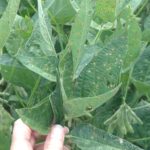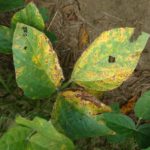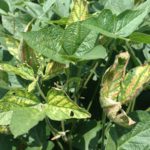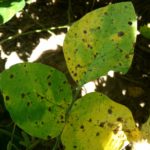Most soybeans have gotten into reproductive growth stages and diseases may have started appearing although at low levels. To better identify diseases and guide management decisions use the resources below…
As can be expected many diseases of soybean do not appear until reproductive growth stages. Diseases that have been reported in West Tennessee to date include target spot, septoria brown spot, frogeye leaf spot, and sudden death syndrome. More resources for disease identification and management options can be found at UTcrops.com and the mobile friendly field guide at guide.utcrops.com.




To determine if a disease will become a significant PEST, that will effect yield, four main factors need to be considered…
- Pathogen presence – can be influenced by field history
- Environment – the right conditions for disease to develop
- Susceptible host – a variety that is susceptible to disease
- Time – regarding the growth stage of the plant and when the disease develops
Many diseases can be avoided by planting a disease resistant variety, regularly rotating to non-host crops, and when warranted fungicide applications can be applied. UT research has indicated that under circumstances of high disease pressure and conducive environmental conditions, timing a fungicide application at R3-R5 (beginning pod develop to beginning seed development) provides the most consistent yield protection.
A foliar fungicide efficacy table (Soybean Fungicide Efficacy Table found at UTCrops.com) developed by The North Central Regional Committee on Soybean Diseases (NCERA-137) and modified as needed by each state, provides information on foliar fungicide efficacy for control of major foliar soybean diseases. As always variety selection is the first and usually strongest line of defense against disease. Specific variety response to a fungicide at R3, at locations with different disease pressures can be found at search.utcrops.com/diseases and other variety information on search.UTcrops.com.
Lastly, there may be soil pathogens affecting yield and to better understand the soil pathogens in Tennessee field crops, with support from the Tennessee Soybean Promotion Board, UT is running a free soil screening for all pathogenic nematodes and charcoal rot. Soil sampling instructions, mailing address, and form to fill out can be found here and at UTcrops.com.

